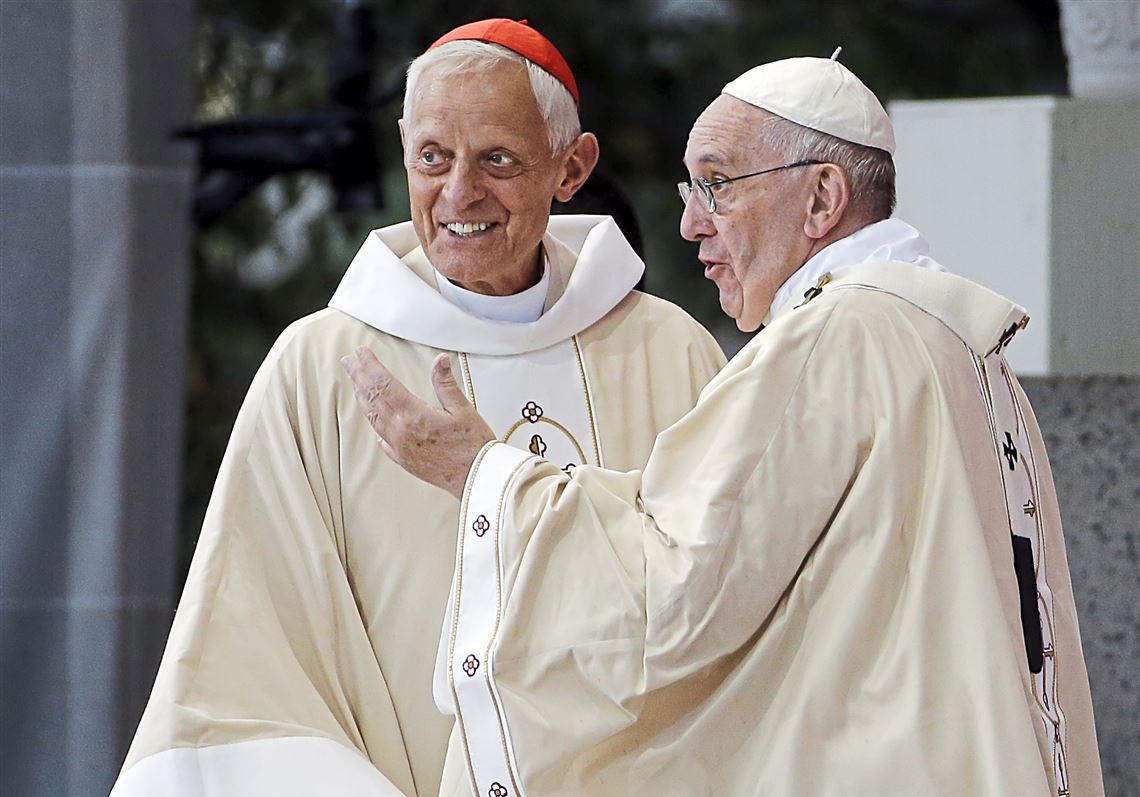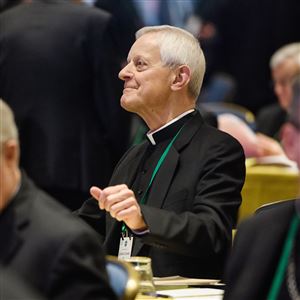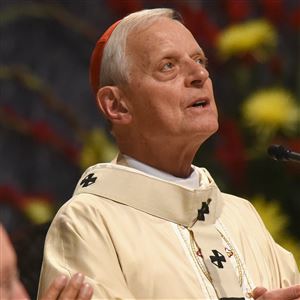
Michelle Boorstein
The Washington Post
Jan 11, 2019
12:20 AM
Washington Cardinal Donald Wuerl knew of sexual misconduct allegations against ex-cardinal Theodore McCarrick and reported them to the Vatican in 2004, church officials confirmed Thursday evening, despite portraying himself since last summer as unaware of any complaints surrounding McCarrick.
Robert Ciolek, a former priest who reached a settlement with the church in 2005 after accusing clerics including McCarrick, told The Post he recently learned that the Pittsburgh Diocese has a file that shows that Wuerl was aware of his allegations against McCarrick. The file includes documentation that Wuerl, who was bishop of Pittsburgh at the time, shared the information with then-Vatican ambassador Gabriel Montalvo.
The content of the document, which Ciolek told The Post he saw in December, clashes sharply with Wuerl’s public statements about McCarrick since the older cleric was suspended in June due to a complaint that he groped an altar boy decades ago.
The explosive allegations against McCarrick, which include two other accusations of abusing minors as well as those of harassment of seminarians, tipped off a full-blown crisis in the American Catholic Church. All along, Wuerl has largely rejected charges that he played a role in it.

Peter Smith
Wuerl knew of McCarrick accusation in 2004
McCarrick’s case is reportedly now about to be decided in one of the highest-profile clergy sex abuse trial processes to come before Rome.
Both the Washington Archdiocese and the Pittsburgh diocese Thursday night acknowledged Wuerl knew and told the Vatican, and said they were simply trying to protect Ciolek’s confidentiality.
Ciolek dismissed that Thursday. “There was nothing that precluded them from talking to anyone” about his case. Wuerl at worst could have said: ‘I am aware but I can’t name that person.’ ”
Wuerl himself was forced to retire early in the fall due to his alleged mishandling of clergy sexual misconduct when he was bishop of Pittsburgh, and his replacement is rumored to be named in coming weeks. A grand jury report by Pennsylvania prosecutors detailing extensive clergy abuse and coverup in the state and criticizing Wuerl for not doing more has heaped fuel on the belief that the Catholic Church hasn’t reformed itself at its highest levels.

In this March 4, 2015, file photo, Cardinal Theodore McCarrick speaks during a memorial service in South Bend, Ind. (Robert Franklin/South Bend Tribune via AP)
Many Catholics have been angered and hurt by reports that the popular, prominent McCarrick, who was Wuerl’s predecessor as Archbishop of Washington, regularly engaged in misconduct and that it was an open secret among the hierarchy.
Wuerl, a close ally of Pope Francis seen as a loyal, effective and cautious administrator, has portrayed the McCarrick matter as news to him when he’s been asked since June.
In June, he said: “I can report that no claim - credible or otherwise - has been made against Cardinal McCarrick during his time here in Washington.” He denied in that statement and in others knowing about the settlements, and said after the first youth allegation only that he was “shocked and saddened.”

Peter Smith, Tracie Mauriello and Liz Navratil
Pope accepts Cardinal Donald Wuerl's resignation but keeps him on in 'caretaker' role
In a July 31 interview in the archdiocesan paper Catholic Standard, Wuerl said:
“There have also been numerous stories or blog posts that repeated long-standing rumors or innuendos that may be out there regarding archbishop McCarrick. . . In the past month, I have seen some of those new public reports. But in my years here in Washington and even before that, I had not heard them. With rumors - especially old rumors going back 30, 40, even 50 years - there is not much we can do unless people come forward to share what they know or what they experienced.”
The District of Columbia archdiocese’s statement Thursday said Wuerl did not intend “to be imprecise” with his public statements.
“Furthermore, Cardinal Wuerl has attempted to be accurate in addressing questions about Archbishop McCarrick. His statements previously referred to claims of sexual abuse of a minor by Archbishop McCarrick, as well as rumors of such behavior.”
The documents Ciolek says he saw in December in the Pittsburgh Diocese priest personnel file show Wuerl went to the Vatican’s U.S. representative in the fall of 2004 about McCarrick. In May 2006 the Vatican announced McCarrick’s retirement as Archbishop of Washington and the appointment of Wuerl to replace him as head of the District archdiocese, one of the country’s most prestigious.
Ciolek shared the documents with the Post with regret, he said, because he had first asked repeatedly to meet with Wuerl and was ultimately rebuffed after being given a list of proposed restrictions by Kim Viti Fiorentino, the District archdiocese’s chancellor and general counsel. Among them, he said: If he met with Wuerl, he could not take notes, record or ask questions. The visit, he was told, was meant to offer Wuerl’s “pastoral” care, said Ciolek, who is now a married lawyer in New Jersey.
In a Jan. 8 email to Fiorentino, Ciolek said he was frustrated that a meeting with Wuerl was put off and then canceled. He told her he had hoped in a face-to-face meeting to thank Wuerl for taking the McCarrick issue to the Vatican’s ambassador in 2004. But he said he also hoped to tell him how hurtful it is - as the victim who brought the sensitive details of the complaint forward 14 years ago - to hear Wuerl publicly deny knowing about McCarrick’s involvement.
“It’s belittling to me as a victim of abuse to have him as a priest and leader of the church to overlook, ignore or lie about what he knows I shared. It’s just beyond disrespectful in terms of what he signals to me when he says those things,” Ciolek said to The Post of Wuerl’s public comments.
“It’s as if I don’t exist. It belittles the significance of the events themselves,” Ciolek said. Nothing will change “unless people come forward,” he said.
The Post reported last fall about Ciolek’s 2005 settlement - which had been revealed in June by New Jersey dioceses on the day McCarrick’s suspension was announced. The New Jersey officials said they had settled two cases with adults who reported being sexually harassed by McCarrick.
What wasn’t known until the Post’s September piece was that the settlement included not only Ciolek’s allegations he was abused at a Catholic high school in New Jersey, but also that he was again subjected to abuse and misconduct in seminary by a Pittsburgh priest and also by McCarrick.
The Post story noted that Wuerl’s name, as the bishop of Pittsburgh, was on the settlement document, raising questions about what Wuerl knew. Ciolek also traveled to Pittsburgh in 2004 to testify before the diocese’s review board.
Washington Archdiocese spokesman Ed McFadden this fall told the Post in response to questions that Wuerl did not know “about the settlement.”
That led Ciolek, he said, to want to understand what Wuerl knew and if he had ever done anything with the in December information about which Ciolek testified. The quest led him back to Pittsburgh in DE.
He requested a copy of the testimony he’d offered to the review board when he came there on Nov. 4, 2004. The nine-page document given to him by the diocese includes an introduction and then sections on his three abusive situations - in high school, with a seminary professor and then with McCarrick, who was Ciolek’s supervising bishop in New Jersey.
In the testimony, Ciolek said McCarrick pressured him and other seminarians to sleep in a double bed with him and would ask to give and receive backrubs. In the testimony, Ciolek described the ex-Carfinal’s alleged conduct as “inappropriate behavior” because McCarrick “exercised extraordinary authority over me.”
Ciolek said in the document that McCarrick knew he had been molested as a teenager, and therefore his actions “violated the trust that I bestowed” on him by acting on his “selfish and distorted impulses.”
In a final section entitled “impact on my life” Ciolek said the abuse he experienced left “deep internal scars, emotional trauma.”
His file included a cover letter dated Nov. 9, 2004, from Ciolek to the diocese’s coordinator, Rita Flaherty. “In response to your request, the Diocese of Pittsburgh is authorized to share this information with ecclesiastical officials, including the papal nuncio.”
After asking to know what else was in the file, Ciolek traveled to Pittsburgh in early December, where he was allowed to see a portion of a file about his case. It was the priest personnel file of the Pittsburgh priest Ciolek says abused him in seminary. Diocesan officials would not allow Ciolek to make copies of or photograph the documents.
However, he said he saw a very brief - perhaps one or two short paragraphs - memo in the file. From his memory, Ciolek said the document was dated right around the time of his Pittsburgh testimony. The words were typed, he said.
“It memorialized Wuerl’s meeting with the papal nuncio earlier that week, and indicated he had shared with the papal nuncio, Archbishop Montalvo, the details involving allegations I had made about McCarrick.” The memo was in the first person, Ciolek said, and included Wuerl’s handwritten initials after his printed name. It said nothing about any response by Montalvo or anything else, Ciolek said.
Questions to church officials in Pittsburgh and Washington about what Wuerl said to Montalvo and what the Vatican representative said back were not immediately answered Wednesday.
Wuerl has reportedly been in Rome this week as a member of the bishop-picking body, participating in conversations about his successor. He was vocal in November at the most recent annual meeting of the U.S. Conference of Catholic Bishops, where the bishops made arguments for how to reform their processes on abuse cases to be more transparent.
Wuerl is also on the broader Vatican body that handles clergy abuse cases - the Congregation for the Doctrine of the Faith, which is overseeing McCarrick’s trial. Another archdiocesan spokeswoman, Chieko Noguchi, told the Post this week that Wuerl is not involved in the McCarrick proceedings but she did not say why.
Ciolek on Thursday praised Wuerl for taking the McCarrick report directly to Rome. At that point, in 2004, Ciolek had already relayed his abuse to several other bishops and to his knowledge none had at that point tried to take it to higher-ups who could take action.
“Reading the document, I felt Wuerl did the right thing. But that good feeling of what he had done has been overshadowed completely by his lying about his knowledge of that.”
On Thursday, Fiorentino emailed Ciolek to say she was sorry he was declining to meet with the archdiocese lawyers instead of Wuerl.
“I sincerely regret that you feel this way towards the Diocese of Pittsburgh, Cardinal Wuerl, and the Church,” she said, again offering Ciolek an opportunity to meetwith lawyers. “I wish you many blessings in the New Year and will continue to keep you in my prayers.”
Ciolek, who comes from a devout, churchgoing family, said he wanted Wuerl to apologize and own up to what happened, actions he feels could be an important part of Catholic healing.
“My hope was real reform, permanent change, serious steps,” he said."Wuerl’s honesty and apology would have gone a long way to giving the Catholic community better hope that the church is serious about change.”
No comments:
Post a Comment